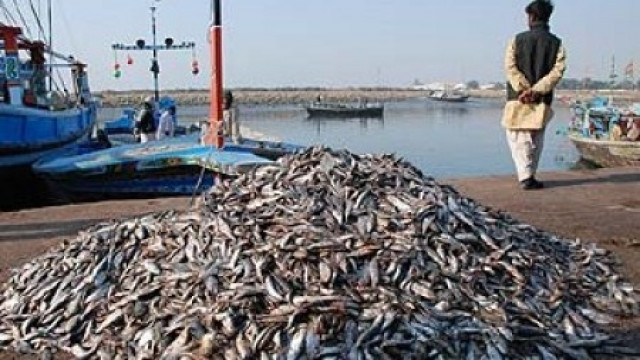We are not a nation of big fish eaters. I came across this revelation one night, as I looked around the dinner table and could not find one food item containing fish. Given the state of our dinner tables, why should Pakistan's fisheries matter? Pakistan's fisheries exports may (including marine, freshwater and aquaculture) represent 1.1% of the total merchandise trade, but they pale in comparison to our other exports such as agriculture. On a social level, out of the population of 172.8 million, only 300,000 people are directly employed as fishermen (this number is based on rather low estimates and may be incorrect) and 400,000 people in associated industries. And as I pointed out earlier, the majority of Pakistanis fill their daily protein requirements (when they can afford to) from terrestrial animals.
Quoting economic, social, and geographic fisheries statistics from the United Nations Food and Agricultural Organisation is all well and good. But macro scale analyses often miss important local and regional trends. Let's look at the numbers again.
700,000, depend on fisheries on some form or another for their living. Multiply this by the average size of a household in Pakistan (assuming that everyone has a wife and some kids, or a number of people they support). The most recent census (1998) states a national average of 6.8 people and this translates into 4.76 million people which is still not much in a population of 172 million people. However, the majority of fisheries production takes place in Sindh (approximately 35 million people) and Balochistan (7.3 million). In this context, the fisheries industry affects 11% of the combined population of the two provinces.
Climate change is very important in the context of Pakistan's fisheries. Despite being a negligent contributor to the global greenhouse gas emissions, Pakistan is predicted to be one of the countries hardest hit by global climate change. In their recent paper "Vulnerability of national economies to the impact of climate change on fisheries", Allison et al (2009) identified Pakistan as one of the four Asian countries (the others being Bangladesh, Yemen and Cambodia) among the most vulnerable to climate change impacts.
In terms of freshwater fisheries, decline in the flow of the Indus river due to reduction in snowfall and glacial accumulation are predicted to decrease the range of the Indus delta and alluvial flood plain, the most productive fisheries habitat in the country. Increasing water surface temperature especially in shallow lakes (<20m) will impact fish biodiversity, favouring warm-water and (temperature preference >20'C) cool-water species (15-20'C) at the expense of cold-water species (<15'C) resulting in tremendous impacts on Northern fisheries which are exclusively dependent on cold-water species such as Waziristan, Suttar, Chiruh and Chush snowtrout. For marine fisheries, changes in ocean surface temperature will also impact many coldwater species resulting in shifts in marine food webs and ecosystem function. Additionally, temperature driven changes in currents could affect species migration patterns as well as growth, survival and reproduction rates ultimately impacting future catch sizes.
Considering that both marine and freshwater fisheries provide a substantial source of income for many communities in both Sindh and Punjab and often provide the only source of protein, the predicted decline in marine and freshwater fisheries is going to have important sociological consequences. Decline in future fisheries catch will lead to decreased revenue for fishing communities in Sindh and Balochistan resulting in increased poverty and food insecurity. Other industries indirectly tied with marine and freshwater fisheries will also suffer.
There have been many recommendations made with regards to mitigating climate change impacts on Pakistani fisheries. Oxfam (a UK based NGO) in a 2009 report focusing on climate change in Pakistan suggested introducing aquaculture based on warm-water species, helping communities establish deep sea fishing practices, introducing shrimp farms to coastal villages and improving fisheries management on a national scale. While these recommendations make sense on sociological level, from a biological standpoint there are some problems. Firstly, the introduction of new species into an environment can negatively impact existing food web and ecosystem processes. Introduced species can proliferate extirpating existing species in similar food web positions impacting both species above and below them in a food web structure. In terms of aquaculture, this risk can be minimised by stocking and promoting local warm-water species instead of introducing them from other regions. With shrimp farming, there is always massive ecosystem destruction. In Pakistan, shrimp farms are built by removing coastal mangrove wetlands which act as hatcheries for the vast majority of warm and cool water species. The removal of mangrove wetlands from a region causes decrease in fisheries productivity resulting in a decline in regional fish catch for which shrimp farms cannot compensate. If shrimp farms are being promoted as an antidote to declining fisheries productivity, a better solution both biologically and economically would be to increase the area of the nearest mangrove wetland, which would result in an increase in regional fish and shrimp catch.
Fisheries are important economically, socially and biologically for the people of Pakistan. Given that current climate change forecasts list Pakistan as especially vulnerable to fisheries collapse, it is essential for the government to plan appropriate mitigation measures to deal with this scenario. Considering that Pakistan is currently dealing with a violent insurgency targeting the civilian population, massive shortages in food, water and electricity it is very unlikely that there will be any sort of intervention on a state level regarding the threat of climate change towards its fisheries. This is of course the trouble with Pakistan. We never get around to dealing with issues that could become serious problems for us in the future. If extremist ideology, food security, electricity and water had been dealt with two decades ago, we would not be facing these crises today. I fear that this too will be the case with Pakistan's fisheries.
This post was originally published on Sarah Hasnain's blog. Sarah tweets at twitter.com/kissmyroti.
What do fish have to do with climate change?



COMMENTS
Comments are moderated and generally will be posted if they are on-topic and not abusive.
For more information, please see our Comments FAQ